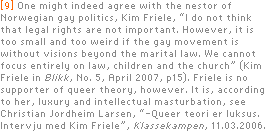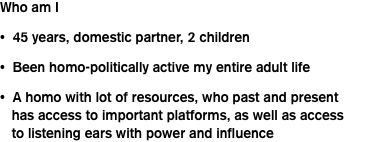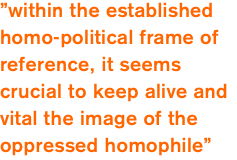| 
My first incentive to write about gay elitism came about in April 2007. An interview with two prominent gay politicians in the only Norwegian gay and lesbian magazine, Blikk, set me off writing a rather passionate letter to the editor on the rethinking of anti-discriminatory sexual politics.[7] The present Norwegian government is a coalition of the social democrats, the socialists and a centre party, the latter attracting its main constituency in the rural areas. The ones interviewed in the article in Blikk were Håkon Haugli, a social democrat and leader of a group within the social democratic party advising their politicians on gay and lesbian politics, and Gro Lindstad, a socialist working in Parliament, giving advice to the socialist party's elected representatives in fields like foreign politics, politics of defence and on matters concerning refugees. Lindstad is also the deputy of the Oslo branch of her party and a former chair of The Association. When these two commented on The Association's political agenda, as they did in Blikk in April 2007, it was not just anybody talking, but someone with good credentials at the very top level of Norwegian politics. In the interview Haugli says: |  | 

| 
|  |  | We are standing at an important crossroad. The possibility of full equality is within reach in the very near future. What will happen to us then, when we no longer have a major issue to fight for? I'm worried we'll have an identity crisis, despite all the issues that are still lined up, begging to be solved.[8] |  | 
| 
|  |  | When Haugli says that full equality is within reach, he is thinking of the gender-neutral marital law that will probably become reality in the spring of 2008, a law granting gays and lesbians adoption rights, the right to reproductive assistance, the same rights as heterosexual couples concerning inheritance and taxes, and most likely, as a consequence of this, quite a few of the pastors in the state Lutheran church will start performing ceremonies for gay and lesbian couples. At present, a new marital law is the major issue, and something of a jewel in the crown of gay rights politics which in recent years has become quite family-oriented.[9] Haugli rightly foresees a new situation coming up after equality is obtained in the legal sense. The issues he and Lindstad mention in the interview, after equality before the law, are mainly twofold. Firstly, there is the broader question of conditions for gays around the world who do not enjoy the same rights as we do. And on the home front, which after all has to be the basis for The Association's politics, there is the question of the health of Norwegian homosexuals who at the moment, it seems, drink too much alcohol, use too many drugs and, especially among the young, have higher attempted suicide rates than others. So the statistics say, and they had better be right, because statistics on suicide, health and drugs are the main field for the government's investment in research on homosexuality. I will return to this. What triggered my concern in the interview was that Haugli and Lindstad do not, as one might have expected when one sees a crisis coming, say that we will have to rethink our agenda, our strategy or how to understand political work in this new situation. I would have expected this, especially as they also stress in the same interview how important it is to think through a long-term perspective. But no, the medicine was identical to what we have been prescribed up till now, namely to intensify the work of pressure on politicians and especially on politicians in Parliament in the capital of Oslo. Lindstad spells out what is required of The Association: |  | 
| 
|  |  | Activity towards the Parliament [...] to be a resource, to contact politicians often, give input. After a while, politicians in Parliament will themselves start calling, to get the competence of The Association… It's all about some weekly phone calls around, to hear what's going on… Now we hear little or nothing.[10] |  | 
| 
|  |  | This really puzzled me, and it also made me annoyed because for the last 20 years, debates on sexual politics have been going on in Norway and elsewhere, influenced by poststructuralism and queer theory, that might have something to offer, and not least when one has, as we saw Haugli state, an identity crisis. This must not even be contemplated. According to Lindstad, future perspectives may not: [...] be reduced to academic debates about queer theory and the like which sidetrack gay politics. That would be of no help to the young and doubtful homophile in Suldal [a typical name for a rural village] or homophiles having stones thrown at them in Tallinn because they try to march in a gay parade.[11] |  | 
| 
|  |  | So there you are, queer perspectives are not seen as relevant for rethinking gay politics in a country where even the gay and lesbian socialist politicians admit that there is little more to achieve in jurisdiction. In my reply in Blikk I ended by saying that it is almost unbelievable that gay and lesbian advisers should actively dismiss queer theory. How could that be, since many people, especially the young, are interested in it, and surely the issue could be at least discussed? Are they perhaps protecting their own identity and continuing importance as gay politicians of a particular stature? Is this rejection, I wondered, not so much about the potential of new ideas to fight against homonegativity and homophobia, but about the queer potential of questioning elitist gay positions, positions that might be seen as needing to rely upon the idea of an open discrimination against the homophiles?[12] |  | 
| 
|  |  | 
One important event before the debate in Blikk was the conference “Homo Politics meets gender research and vice versa” (Homopolitikken møter kjønnsforskningen og omvendt), organised in the autumn of 2005 by the state-funded Information Centre for Gender Research in Norway (KILDEN), on assignment from the gender research programme in The Research Council of Norway. Thus, the conference had a certain status. Among other contributors, the social democratic State Secretary, Kjell Erik Øie, was invited to speak for 45 minutes, and I was invited to give a 20-minute comment. Øie is a former chair of The Association (1987-1991) and a successful central lobbyist for the right to domestic partnership for gays and lesbians, achieved in 1993. He is perhaps the most prominent gay politician in the Norwegian public. Over the years, I have noticed and appreciated his work. I received his talk a couple of days before the conference, and it turned out to be a Power Point bullet presentation, beginning with the opening bullet points where he presents himself under the title, “Who am I” (my translation): |  | | 
|  |  | 
|  | | 
|  |  | This was enough material already for my own 20 minutes. In my comment I made an interpretation of these bullet points, trying to draw a fuller picture of the person here briefly sketched. I would see him as a family man, with his paperwork completed, responsible, tied to past, present and future through his work and family life, with responsibility for the next generation. He is a person to trust, he has steadily been doing good political work all his life. He might have made sacrifices, but never gave up, and will not now. He has power, meets with powerful people, formally and informally. I made the point that we had come a long way when an openly gay person, in national politics, could present himself in this way in public. I also, in a friendly and joking way, I thought, pointed out that except from the homosexuality, this person seems to be extremely well-adjusted and established, his life itself connecting to the main issues of the gay movement and gay politicians in Norway in recent years: domestic partnership and now the gender-neutral marital law. Perhaps then, I asked, was it not just in spite of homosexuality, but also because of homosexuality as a cause that it had it been possible for him to become this sturdy representative of social order? My point in presenting this is that he did not seem to find any of it interesting or challenging - and certainly not at all amusing. With my knowledge about political and academic subculture on the “leftish” side of politics, I was sure that Øie and I would exchange some thoughts about his talk and mine when we were done presenting, especially in this case, since both were plenary talks without comments from the floor or any debate. I was, however, both surprised and disappointed that he just passed me on the way out of the conference hall, head high, saying with obvious contempt, aloud to no one in particular, “I ought to have seen this coming”. It might be that I had been too provocative, despite my self-perception as friendly and well intentioned, but to me this nevertheless later came to represent a quite intense dismissal of my take on the question of power. (I should add that my talk was otherwise very well-received, by other scholars as well as activists). For him, so it seemed to me, homosexuality was to be seen only as oppressed in society, and it was inappropriate to suggest that in certain cultural contexts, gayness might also provide for a good middle-class life, based on a democratic society's consciousness and guilt as oppressor. I began to think that within the established homo-political frame of reference, it seems crucial to keep alive and vital the image of the oppressed homophile, and not only on the political arena. In his talk about research and gay politics, Øie would point in particular to the quantitative studies of (the poor) health and quality of life among the homophiles and lesbians. |  | 
| 
|  |  | 

|  |  |
|